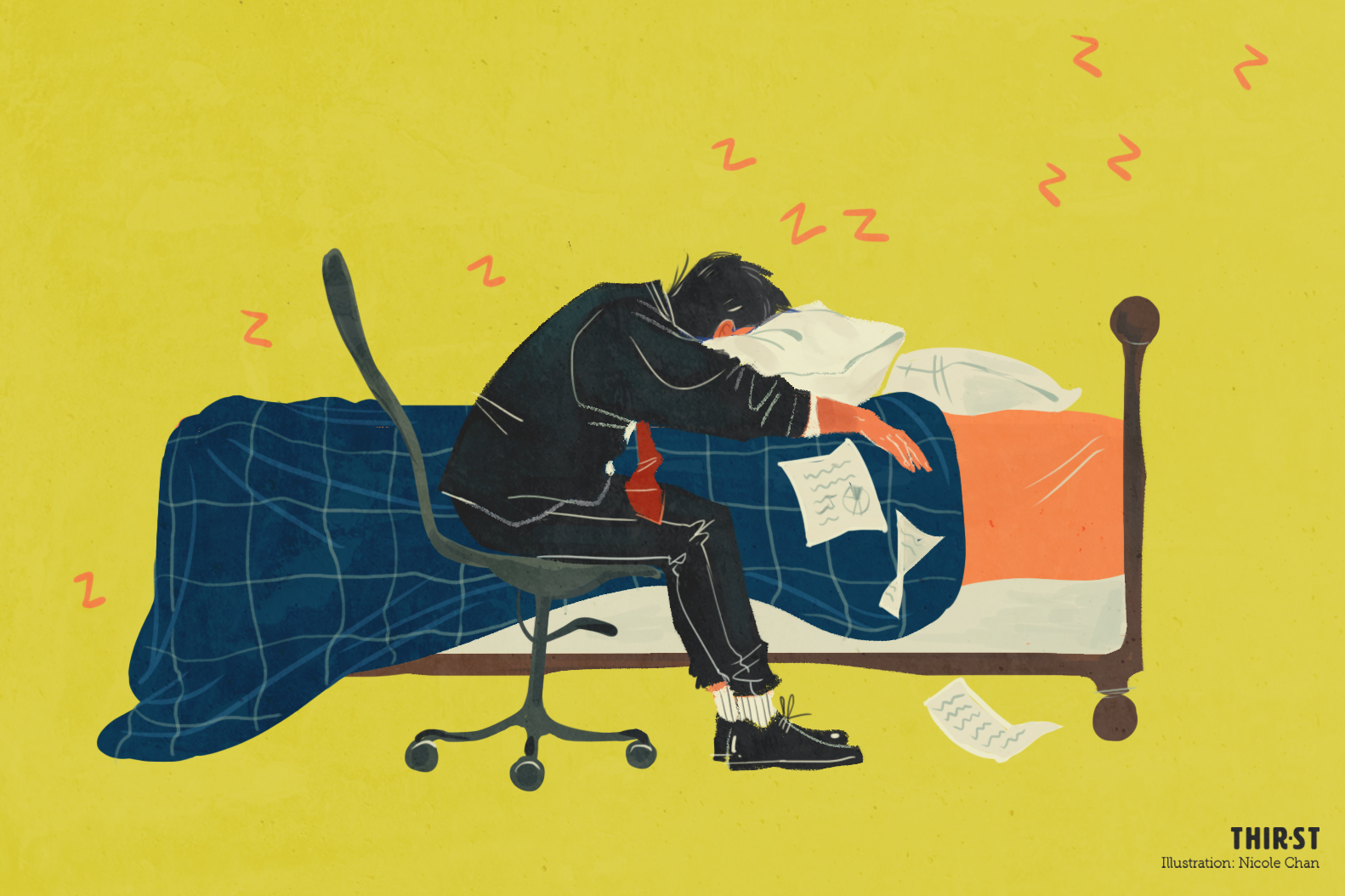I think all of us are familiar with the question: “Do you live to eat, or eat to live?” The answer reveals our true philosophy – what defines us.
If we eat to live, then survival is our instinct. If we live to eat, then enjoyment is one of our #lifegoals.
How then would you answer this question: “Do you work to rest, or rest to work?”
Should work define us and be the be-all and end-all of our existence – something core to our identity?
Is rest just the thing that we do in order to be able to do more work? Or is work something temporal in order to earn our retirement? Is rest the objective?
Perhaps, it’s something different altogether.
THE EVIL-WORK MENTALITY
Work is often seen as the activity I need to do to get life.
Therefore, to most people, no work would mean no money, no food and no life. But that didn’t seem like the kind of work God created Adam (and us!) for.
Genesis 2:15 says: “The Lord God took the man and put him in the garden of Eden to work it and keep it”. Does that mean the work that Adam was created to do was horticultural maintenance?
The garden is already great. It is called paradise, it produces fantastic fruit, plus there’s no rain! This doesn’t seem to add up. Why does Adam need to work this park at all?

In the Young’s Literal Translation (YLT) of Genesis 2:15, it reads that “God taketh the man and causeth him to rest in the garden of Eden”.
Adam was not so much placed in the garden, as he was “rested” in the garden. Adam (and later Eve) was placed in this beautiful paradise, not to work the ground (that comes later), but to enjoy the fruits of God’s work for him.
“Rest” had nothing to do with sleep, but much more with trusting, enjoying, living and experiencing God.
All of Adam’s life came from God and would always continue to come from God. Adam started in rest. The main thing Adam and Eve needed to do was to trust God and learn His ways.
“Rest” had nothing to do with sleep, but much more with trusting, enjoying, living and experiencing God.
With an abundance of God’s provision in Eden, surely the right response was to lean back and rest in the goodness of God. To trust Him, enjoy Him, have life through and with Him.
Yet, Adam couldn’t rest and he couldn’t trust. Just like the story of the prodigal son, the son had everything he wanted and asked for but still felt like he did not have enough – nothing made him happy.
We like the idea of being our own masters, attempting to earn our own life through the work of our hands. Eventually, we become used to the idea of living outside of God’s presence and providence.
As the generations press on, we believe that the more we work, the better it will get.
If I put in more effort, more time, more energy, do enough, strive enough, fight enough, increase intelligence, increase wealth, increase power – then I will have more life!
This is the evil-work logic. It is hardwired into our thinking, that our own hands can bring us life. The rat-race mentality also sets in. Values like competition, elitism and exclusiveness arise. Dog-eat-dog – kill or be killed.
These are the vermin voices that plague our mind.
We have to trust that God is true food and true drink.
Jesus says this very bluntly: “Do not labour for the food that perishes” (John 6:27).
He warned us that if we spend all our energies doing this evil-work, it will be laborious, difficult, stressful and anxiety-inducing.
Yes, we may get some food, we may build some semblance of life, but in the end, it is only that miserable rat-race life. Stop it, Jesus says. Do not labour for such food.
God has got to stop us in our tracks so that we can begin to redirect our evil-work energies into trusting that He is true food and true drink.
Or as Jesus puts it in Matthew 6:33: “Seek first the Kingdom of God, and all these things will be given to you!”
THE GOOD WORK OF CHRIST
Yet ceasing from evil-work is not God’s only goal. He has obviously prepared good-work for us to do.
Good-work comes out of enjoying the Father’s rest. Good-work will be in line with the Father’s work of pointing others to His rest.
Good-work is not about earning life; good-work is about sharing life. It’s the kind of work Jesus did – giving others life from death.
Good-work is not really defined by simply having a moral career, but rather a work that is fuelled by the right motivation and does not come under the curse.
Good-work comes out of enjoying the Father’s rest.
I’m a pastor. So, naturally, all my work should be good-work right? Wrong.
I’ve learned over the years that when I write great sermons (based on congregation feedback), there are two ways I have fuelled them.
The first fuel is often anxiety.
I have a deadline, and I stress about how the sermon is going to sound. I then use that unease to push a sermon out. Surprisingly, the greater the anxiety, the “better” the sermon (at least in a superficial way) because I am most worried about what others will think.
Yet after the sermon is done, I enter a new round of stress.
- Waiting for the feedback
- Avoiding eye contact
- Dreading the next email
- Reacting strongly to criticism
- Lacking the ability to hold affirmation
The last thing I want to do is spend time praying and thanking God. I just want to curl up with Netflix and a heavy meal.
This was an evil-work, and the results – no matter how good it sounded – were only evil.

The second way I could write that sermon is being fuelled by God’s love.
I stop, put my work aside, get out my Bible and pray. I remind myself that I am God’s sheep first, before being a shepherd. I remember all the good things He has already done, as well as the times He has delivered my sermons for me and ministered to me through His words.
I proceed to think about the text and what He’s saying to me first, rather than how to “sermonise” it.
Now a new flavour appears: I think about the pastoral condition of my flock, I remember people whom certain words may hurt or trigger, others that need comfort or reassurance.
I remind myself that I am God’s sheep first, before being a shepherd.
The sermon is no longer delivered to stem my anxiety, but to minister for the lost and struggling.
Not as flashy as the first, but infinitely more powerful.
I am less reactive to both good and bad feedback. I can look people in the eye and want to have follow-up conversations. I find myself going back to God in prayer and sincere thanksgiving – not so much for the sermon delivery but the fact that I knew He was with me in the process.
I go back to resting again in His tender care and words, “Good-work, my faithful servant“.
The first sermon came out of unrest. The second sermon came out of God’s rest, and hopefully pointed others to that same rest.
Just because someone brings order, volunteers, creates efficiency, is a campaigner for social justice, makes beautiful music or art, brings deep insight, builds a team, outlines a vision, acts as a peacemaker – doesn’t make it good-work.
What’s the fuel behind it? That is the key question.
Whenever I sense myself doing an evil-work, I stop and take the time to receive good things from God – in prayer, in worship, in Scripture, in His creation or in conversing with a Christian brother or sister.
I remember what God has worked for me, I remember who He is, I delight in the fact of the eternal Sabbath which is a gift prepared for me. I take this joy as my strength.
Then I go, I move, I act.
This article is an edited excerpt from Pastor Dev Menon’s book, The Rest Race. The Rest Race can be purchased from Graceworks’ online store.
- Think about the kind of work you are producing. Is it a good-work or an evil-work?
- What really fuels your work?
- How can you rest in God and realign yourself this week?










